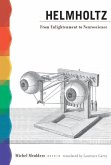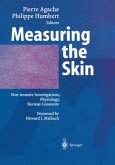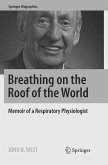Thermal Physiology
A Worldwide History
Herausgegeben:Blatteis, Clark M.; Taylor, Nigel A. S.; Mitchell, Duncan
Thermal Physiology
A Worldwide History
Herausgegeben:Blatteis, Clark M.; Taylor, Nigel A. S.; Mitchell, Duncan
- Gebundenes Buch
- Merkliste
- Auf die Merkliste
- Bewerten Bewerten
- Teilen
- Produkt teilen
- Produkterinnerung
- Produkterinnerung
This edited volume records the critical historical developments in thermal physiology and makes them accessible to new and senior thermal biologists and scientists in related fields. Readers will discover how the discipline developed all over the world. Contributions from 14 different countries recollect all prominent discoveries, starting in the 18th century. Like other volumes of the Perspectives in Physiology series, this book reveals the people behind these discoveries. The authors also set the scenes in which the research was conducted in their countries. From geopolitical frameworks to…mehr
Andere Kunden interessierten sich auch für
![Marine Physiology Down East: The Story of the Mt. Desert Island Biological Laboratory Marine Physiology Down East: The Story of the Mt. Desert Island Biological Laboratory]() David H. EvansMarine Physiology Down East: The Story of the Mt. Desert Island Biological Laboratory168,99 €
David H. EvansMarine Physiology Down East: The Story of the Mt. Desert Island Biological Laboratory168,99 €![Pioneers in Cell Physiology: The Story of Warren and Margaret Lewis Pioneers in Cell Physiology: The Story of Warren and Margaret Lewis]() David H. EvansPioneers in Cell Physiology: The Story of Warren and Margaret Lewis74,99 €
David H. EvansPioneers in Cell Physiology: The Story of Warren and Margaret Lewis74,99 €![Pioneers in Cell Physiology: The Story of Warren and Margaret Lewis Pioneers in Cell Physiology: The Story of Warren and Margaret Lewis]() David H. EvansPioneers in Cell Physiology: The Story of Warren and Margaret Lewis74,99 €
David H. EvansPioneers in Cell Physiology: The Story of Warren and Margaret Lewis74,99 €![Helmholtz Helmholtz]() Michel MeuldersHelmholtz18,99 €
Michel MeuldersHelmholtz18,99 €![The alpha-1 Adrenergic Receptors The alpha-1 Adrenergic Receptors]() RuffoloThe alpha-1 Adrenergic Receptors166,99 €
RuffoloThe alpha-1 Adrenergic Receptors166,99 €![Measuring the Skin Measuring the Skin]() Pierre AgacheMeasuring the Skin215,99 €
Pierre AgacheMeasuring the Skin215,99 €![Breathing on the Roof of the World Breathing on the Roof of the World]() John B. WestBreathing on the Roof of the World103,99 €
John B. WestBreathing on the Roof of the World103,99 €-
-
-
This edited volume records the critical historical developments in thermal physiology and makes them accessible to new and senior thermal biologists and scientists in related fields. Readers will discover how the discipline developed all over the world. Contributions from 14 different countries recollect all prominent discoveries, starting in the 18th century. Like other volumes of the Perspectives in Physiology series, this book reveals the people behind these discoveries. The authors also set the scenes in which the research was conducted in their countries. From geopolitical frameworks to new technologies and extraordinary personalities - this volume shows that scientific progress is influenced by many, often unforeseeable, factors. The history of thermal physiology not only is a story about individual outstanding scientists, but a testament for open collaboration and international comradery.
Produktdetails
- Produktdetails
- Perspectives in Physiology
- Verlag: Springer / Springer New York / Springer, Berlin / The American Physiological Society
- Artikelnr. des Verlages: 978-1-0716-2360-2
- 1st ed. 2022
- Seitenzahl: 692
- Erscheinungstermin: 23. September 2022
- Englisch
- Abmessung: 241mm x 160mm x 43mm
- Gewicht: 1191g
- ISBN-13: 9781071623602
- ISBN-10: 1071623605
- Artikelnr.: 63279214
- Herstellerkennzeichnung Die Herstellerinformationen sind derzeit nicht verfügbar.
- Perspectives in Physiology
- Verlag: Springer / Springer New York / Springer, Berlin / The American Physiological Society
- Artikelnr. des Verlages: 978-1-0716-2360-2
- 1st ed. 2022
- Seitenzahl: 692
- Erscheinungstermin: 23. September 2022
- Englisch
- Abmessung: 241mm x 160mm x 43mm
- Gewicht: 1191g
- ISBN-13: 9781071623602
- ISBN-10: 1071623605
- Artikelnr.: 63279214
- Herstellerkennzeichnung Die Herstellerinformationen sind derzeit nicht verfügbar.
Clark M. Blatteis, Ph.D. is a distinguished University Professor Emeritus. Clark Martin Blatteis dedicated his scholarly life to thermal physiology research for 67 years from the very the beginning of his graduate education at the University of Iowa in 1954 until his untimely death in 2021, while editing this book, chronicling the history of thermal regulation from the early days of the last century to the present day. This monography undoubtedly is the most comprehensive account of thermal physiology research in the world. Born in Berlin, his family was among the passengers of the infamous "Voyage of the Damned" in which the St. Louis ocean liner tried to rescue German Jews from Nazi persecution just to end up back in Hamburg after the ship was not allowed to dock in many ports in the Americas. Through an adventurous journey to Morocco, they survived WWII to finally arrive and settle in the USA in 1948. A preeminent student through his studies his interest in thermal regulation took him to conduct his research studies literally around the world. With a fresh PhD, commissioned as 1st Lieutenant, served at US Army Medical Research Lab, while he conducted his studies from arctic to the hot temperatures of the desert that lead to seminal discoveries helping the development of methods to protect soldiers from extreme temperatures. After serving as a civilian researcher at US Army Research Institute of Environmental Medicine, in 1966 he accepted a faculty at the University of Tennessee, the institution he retired from in 2008 after publishing over 200 research papers and several books, and book chapters. Elected to Chair of the International Union of Physiological Sciences Thermal Physiology Commission and to membership in the International Physiology Committee, he has been a global ambassador of thermal physiology research recognized by countless honours and awards from Peru to Japan, from the United Kingdom to Mexico, including the Max Planck Foundationin his birth country Germany. In recognition of his distinguished research and service contributions, The American Physiological Society inducted Dr. Blatteis among the first class of scholars in its "Living History of Physiology" project. This book is a testimonial to his motto of a researcher's fundamental qualities: Curiosity and perseverance. Dr. Blatteis, the editor of this book, will be recognized by future generations as a giant in field of integrative physiology of thermal regulation. Nigel A.S. Taylor, Ph.D. has over thirty years of research experience in human stress physiology, with emphases on environmental physiology, and in particular, human temperature regulation. He is a graduate of the following institutions: University of Queensland (Australia), University of London (U.K.) and Simon Fraser University (Canada). He completed post-doctoral studies at the Naval Medical Research Institute (U.S.A.), and held an academic position at the University of Otago (New Zealand) before returning to Australia in 1991 (University of Wollongong). He served as a member of the Thermal Section of the International Commission on Comparative Physiology from 2002-2014, and was the Co-Chair from 2006 and Chair from 2012. Nigel retired from administration, but not from life or science, in 2018. Duncan Mitchell, Ph.D. is an Emeritus Professor with 55-year research career in thermal physiology began in the South African gold mines, helping to ensure the welfare of miners. After three years at the National Institute for Medical Research in London, UK, working on somatosensory physiology and on fever, he joined the University of the Witwatersrand, Johannesburg, in 1975. He was Director of its Brain Function Research Group, with research programmes in thermal physiology, pain and sleep. Recently he and his colleagues have employed biologgers implanted in mammals living free in their natural habitats, to investigate latent physiological talents thatmay help combat climate change. He was awarded the 2010 Harry Oppenheimer Fellowship, Africa's most-prestigious award for an individual researcher.
- 1. A History of Thermal Physiology in the United Kingdom of Great Britain and Northern Ireland and the Republic of Ireland. - 2. Contributions of French Research to the Knowledge of Thermal Physiology from the Eighteenth to the Twenty-First Century. - 3. A History of Physiological Research on Temperature Regulation in Germany. - 4. Not Only Winter, Not Only Cold: History of Thermal Physiology in Finland. - 5. Thermal Physiology in the USA: A 100-Year History of the Science and Its Scientists (1880-1980). - 6. Contributions from a Land Down Under: The Arid Continent. - 7. History of Thermal Physiology in Denmark. - 8. South African Thermal Physiology: Highlights from the Twentieth Century. - 9. Japanese Contributions to the Development of Knowledge of Thermal Physiology in the 20th Century. - 10. Thermoregulatory Studies in Hungary: Historical Background. - 11. The History of Thermal Physiology in Israel. - 12. The History of Thermal Physiology in Norway. - 13. Development of Research on the Thermoregulatory System in Russia. - 14. Contributions from the Land of the Maple Leaf: Canada.
- 1. A History of Thermal Physiology in the United Kingdom of Great Britain and Northern Ireland and the Republic of Ireland. - 2. Contributions of French Research to the Knowledge of Thermal Physiology from the Eighteenth to the Twenty-First Century. - 3. A History of Physiological Research on Temperature Regulation in Germany. - 4. Not Only Winter, Not Only Cold: History of Thermal Physiology in Finland. - 5. Thermal Physiology in the USA: A 100-Year History of the Science and Its Scientists (1880-1980). - 6. Contributions from a Land Down Under: The Arid Continent. - 7. History of Thermal Physiology in Denmark. - 8. South African Thermal Physiology: Highlights from the Twentieth Century. - 9. Japanese Contributions to the Development of Knowledge of Thermal Physiology in the 20th Century. - 10. Thermoregulatory Studies in Hungary: Historical Background. - 11. The History of Thermal Physiology in Israel. - 12. The History of Thermal Physiology in Norway. - 13. Development of Research on the Thermoregulatory System in Russia. - 14. Contributions from the Land of the Maple Leaf: Canada.








